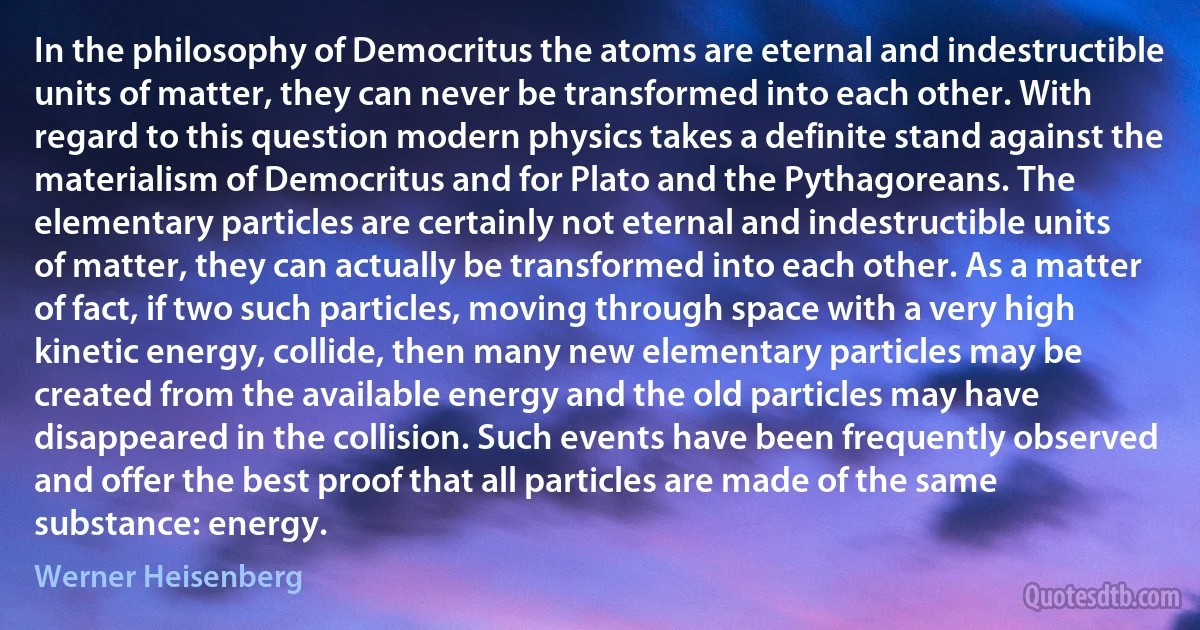
In the philosophy of Democritus the atoms are eternal and indestructible units of matter, they can never be transformed into each other. With regard to this question modern physics takes a definite stand against the materialism of Democritus and for Plato and the Pythagoreans. The elementary particles are certainly not eternal and indestructible units of matter, they can actually be transformed into each other. As a matter of fact, if two such particles, moving through space with a very high kinetic energy, collide, then many new elementary particles may be created from the available energy and the old particles may have disappeared in the collision. Such events have been frequently observed and offer the best proof that all particles are made of the same substance: energy.
Werner HeisenbergRelated topics
best definite elementary high materialism matter moving offer proof question space stand democritusRelated quotes
Naturally man tended to lose his sense of scale and relation. A straight line, or a combination of straight lines, may have still a sort of artistic unity, but what can be done in art with a series of negative symbols? Even if the negative were continuous, the artist might express at least a negation; but supposing that Omar's kinetic analogy of the ball and the players turned out to be a scientific formula! supposing that the highest scientific authority, in order to obtain any unity at all, had to resort to the middle-ages for an imaginary demon to sort his atoms! how could art deal with such problems, and what wonder that art lost unity with philosophy and science! Art had to be confused in order to express confusion; but perhaps it was truest, so.

Henry Adams
The animating purpose of James was, on the other hand, primarily moral and artistic. It is expressed in his phrase, "block universe," employed as a term of adverse criticism. Mechanism and idealism were abhorrent to him because they both hold to a closed universe in which there is no room for novelty and adventure. Both sacrifice individuality and all the values, moral and aesthetic, which hang upon individuality; for according to absolute idealism, as to mechanistic materialism, the individual is simply a part determined by the whole of which he is a part. Only a philosophy of pluralism, of genuine indetermination, and of change which is real and intrinsic gives significance to individuality. It alone justifies struggle in creative activity and gives opportunity for the emergence of the genuinely new.

John Dewey
Avoiding all control, I spread out sheets of white paper or canvas in the nature. For some time they stay in the grass, in the rushes of river, in the meadows or among the rocks. Nature registers its presence, covering the surface of the paper with colors, forms and tracks. This process is controlled by a number of agents; such as space and time, substance and causality. It is governed by nature's intensity. It does not, depend on man's interference. Nature is the greatest and most admirable creator, and unlike logic it doesn't fail. The artist obligation is not to shape - handicraft, but to understand the riddles of reality. In such conception of Art there lies, as in the Universe itself, an immense richness, and a countless variety of forms.

Jacek Tylicki
It was in vain. I brought my hardest right angle into violent collision with the Stranger, pressing on him with a force sufficient to have destroyed any ordinary Circle: but I could feel him slowly and unarrestably slipping from my contact; no edging to the right nor to the left, but moving somehow out of the world, and vanishing to nothing. Soon there was a blank. But still I heard the Intruder's voice.
SPHERE. Why will you refuse to listen to reason? I had hoped to find in you - as being a man of sense and an accomplished mathematician - a fit apostle for the Gospel of the Three Dimensions, which I am allowed to preach once only in a thousand years: but now I know not how to convince you. Stay, I have it. Deeds, and not words, shall proclaim the truth.

Edwin Abbott Abbott
The final test of painting, theirs, mine, any other, is; does the painter's emotion comes across?.. ..Procedure is the keyword.. ..The difference is that we don't begin with a definite sense of procedure. It's free association from the start to the finished state. The old idea was to make use of your talent. This, we feel, is often to take the line of least resistance.. ..painters like Rothko, Pollock, Still, perhaps in reaction to the tendency to analyze which has dominated painting from Seurat to Albers, associate with very little analysis. A new form of expressionism inevitably followed. With De Kooning the procedure is continual change, and the immediacy of the change. With Jackson, it's the confidence you feel from the concentration of his energy in a given picture.. (1958)

Franz Kline
